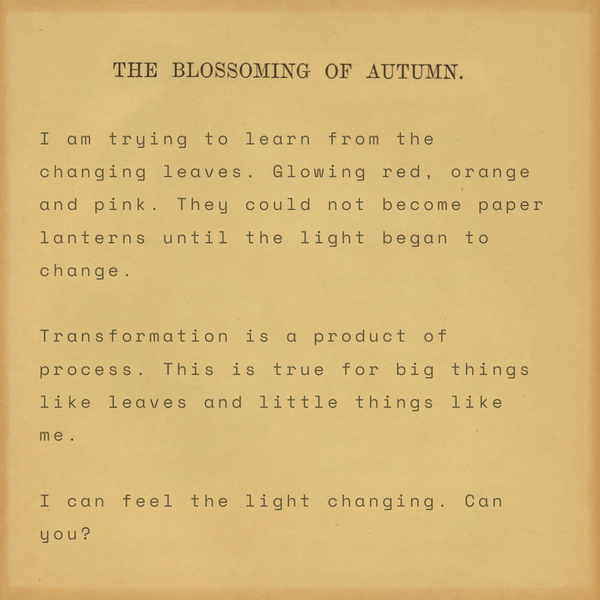If We Die, We Want to Die Together
The state can always find a reason for us to kill each other.
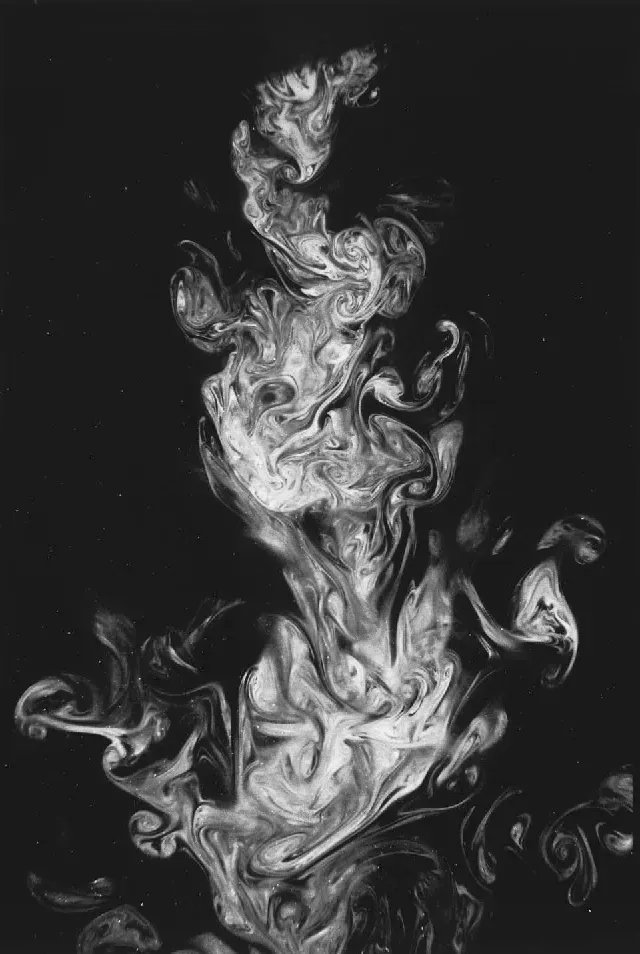
In the first part of this series on the rights of home and the state, I wrote about how fighter jets that invaded Iraq train over my backyard. And I talked about the problem of turbulence. Turbulence is just “the complex, chaotic motion of a fluid”.In physics, a fluid is anything that flows. Liquids are, of course, fluids. But gasses and granular materials like sand are fluids too. Life needs turbulence. Turbulence in our atmosphere mixes warmth, wetness, CO2 and pollutants. It keeps our biosphere balanced.
Turbulence is one of the oldest mysteries in physics. From afar, turbulence seems orderly because we can see ordered structures in a turbulent flow. Each swirl of turbulence bumps into another, creating smaller and smaller swirls. But anything inside of one of those swirls is experiencing chaos. We can’t predict when a smooth flow will become turbulent. And while turbulent flow has ordered structures, we do not know how to predict their path. We do not know how to end the turbulence once it begins.
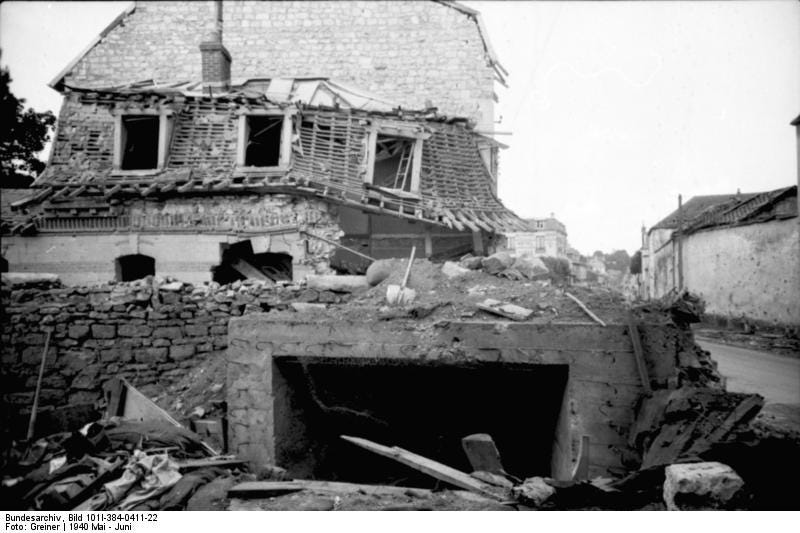
There are people trying to solve the problem of turbulence.
Some people think the problem of turbulence can be solved with math. There’s a non-linear math problem that spreads up and out indefinitely. The solution to that equation might hold the answer. If we could close that equation, turbulence would be understood and managed. No one’s been able to close it.
Some people think the problem of turbulence can be solved with discovery. They say we lack a general theory of turbulence because we still need to discover some quantum mechanical ingredients. “Quantum mechanical ingredients” here just means some very small things. No one has developed the right instrument to discover those very small things.
Air, water and sand aren’t the only things that flow. People do too.
People stream in and out of regions, political power and favor.
Sometimes this movement is what’s called a laminar flow - streams moving next to each other peacefully. Sometimes a laminar flow of people turns to a turbulent one, but in the way turbulence sustains life - mixing and moving people to create a more habitable environment.
But sometimes the turbulence turns violent and we crash into one another.
We have some ideas about what causes a violent turbulent flow of people - war, hunger, oppression, climate change. But we can’t seem solve the problem of turbulence when it comes to the flow of people anymore than when it comes to the flow of water.
Natural rights do not depend on citizenship, creed or custom. They are instead inalienable subatomic ingredients that flow through the veins of each human. When we try to grapple with the chaotic flow of people, we often talk about rights. If we can just figure out human rights, we can solve the problem of turbulence.
Western philosophers have generally been concerned with two types of rights, legal rights and natural rights.
Legal rights are the rights states guarantee their citizens - the “right to a fair trial” is a legal right (theoretically, but not always practically) guaranteed by citizenship in America.
Natural rights do not depend on citizenship, creed or custom. They are instead inalienable subatomic ingredients that follow a natural law.
As a child, I was taught that natural rights were self-evident and inalienable. And that government existed to protect those rights.
We hold these truths to be self-evident, that all men are created equal, that they are endowed by their Creator with certain unalienable Rights, that among these are Life, Liberty and the pursuit of Happiness.--That to secure these rights, Governments are instituted among Men
It may be self-evident that human rights are inalienable, but there’s never been a world where they were also inviolable. Individual rights are often violated by individuals who declared them innate, of course. But they’re also at risk from the states that claim to guarantee them. A state that has the power to secure your rights is also a state with the power to strip them away.
If a state has the power to secure a human’s rights, it also has the power to strip them away.
In 1906, Hannah Arendt was born in Germany to a Jewish family. In 1933, she was arrested and jailed by the Gestapo because of her research on antisemitism in the Nazi Party. Upon her release, she fled Germany and settled in Paris. When her German citizenship was taken from her in 1937, Arendt became a stateless person.
As the Germans prepared to invade France in May 1940, the French deemed Arendt an “enemy alien”. They sent her to an internment camp with other ”enemy aliens.” Most of the people detained were Jewish too. Arendt escaped the camp in the chaos of the Franco-German Armistice in June 1940.
“The conception of human rights based upon the assumed existence of a human being as such broke down at the very moment when those who professed to believe in it were for the first time confronted with people who had indeed lost all other qualities and specific relationships - except that they were still human. The world found nothing sacred in the abstract nakedness of being human.” - Hannah Arendt
Arendt went on to advocate for what she called, “the right to have rights”.
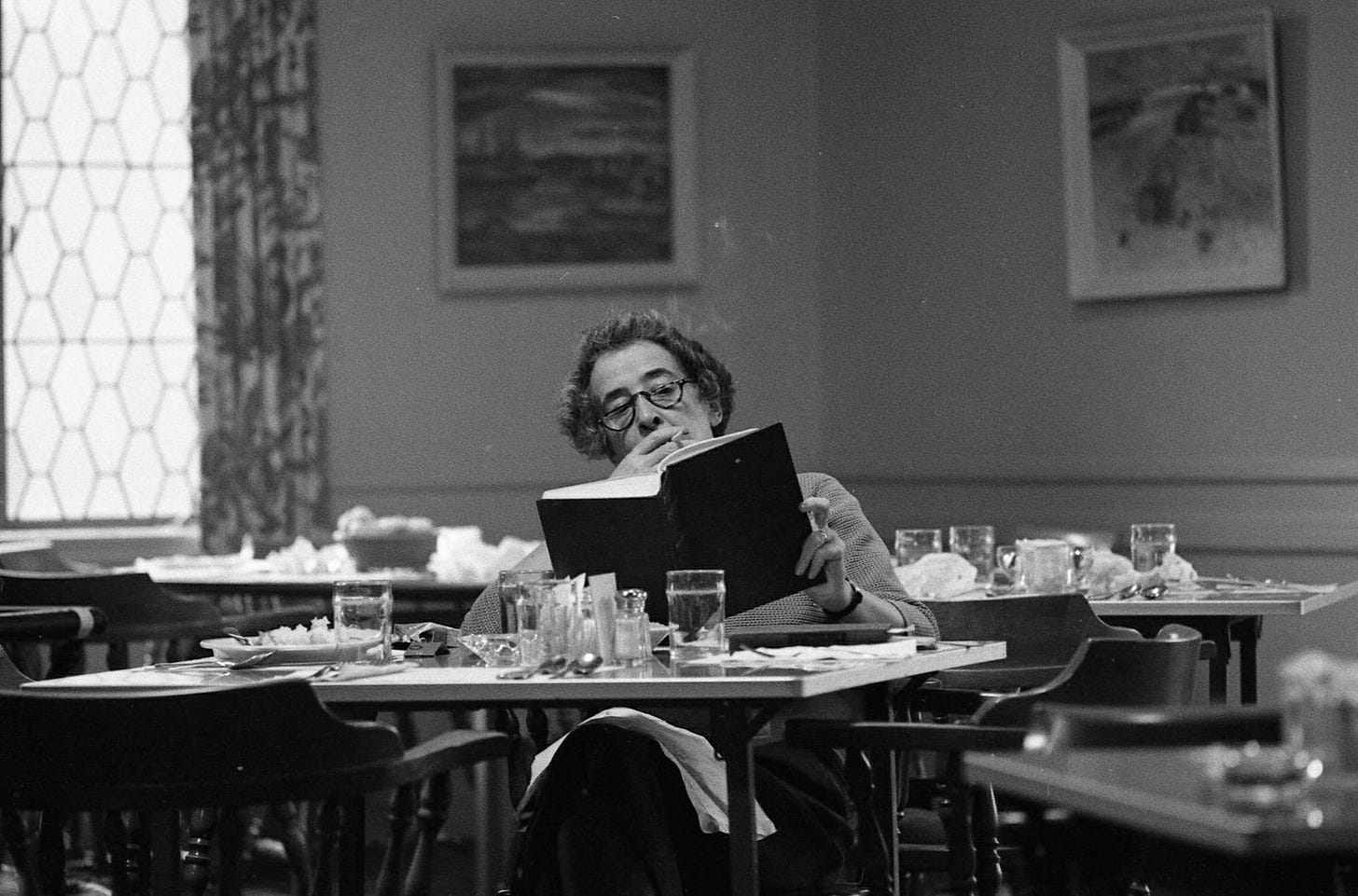
“The right to have rights, or the right of every individual to belong to humanity, should be guaranteed by humanity itself. It is by no means certain whether this is possible…because the present sphere of international law… still operates in terms of reciprocal agreements and treaties between sovereign states.” - Hannah Arendt
Monsters didn’t carry out the monstrous Final Solution, men did. Arendt lost faith in the guarantees of humanity. So she advocated for the guarantees of the democratic state. A pluralistic state dedicated to the ideal of human rights would have to do the work individual humans were unwilling to do.
When Arendt fled Europe, she settled in New York and became an American citizen. Arendt wrote the United States “considered newcomers as possible prospective citizens”, and was her “so-called last hope, maybe only hope”.
I think when many American feel the turbulence of fighter jets flying overhead, they see the defense mechanisms of ahope they share with Arendt. But of course, those jets aren’t just flying in defense of hope. They often fly in pursuit of other, less noble things. And sometimes they fly because that’s what they were built to do.
What is a war machine without war?
America isn't the only state in the skies.
While trying to understand turbulence and sound, my friend Mike helped me, "Not all sound is caused by turbulence but some sound is the byproduct of turbulence.”
Like the sound of a young woman being interviewed while she lives through a war.
On the ninth day of 2021’s eleven day war between Israel and Palestine, Rahf Hallaq was interviewed for a podcast based in America. I cleaned the inside of my home while I listened to her talk.
Hallaq is a 21 year old English Literature major living in Gaza City. She grew up reading Winnie the Pooh and Harry Potter. When the host asked her what she was reading that week, she said Orwell’s 1984. She lives at home with her parents, brothers and sisters. Her littlest sister is four years old.
Hallaq has always lived in what news anchors call “a conflict zone.” The sounds of war have always reverberated around and in her home. Still, she tells her interviewer, she’s never gotten used to the sound of bombs.
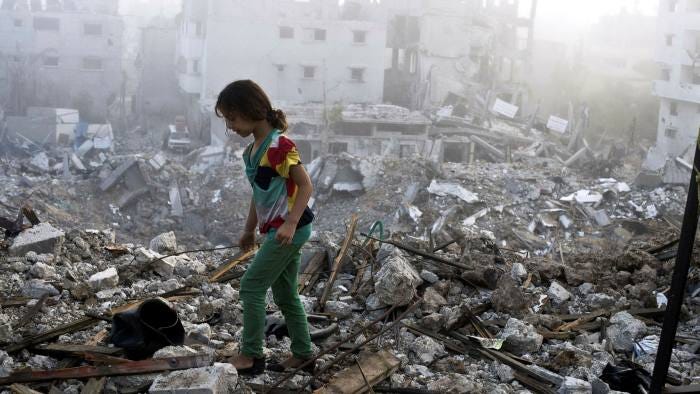
When Israeli bombs are sent into Gaza, Hallaq's family runs to the living room to be together.
“People in Gaza have this thing they always say, like, if we die we want to die together...one of my friends... she said ‘today I put my children to sleep in my bedroom so that if we die, we all die together and no one lives to mourn the death of another one.’ Like every Palestinian family in Gaza does this.” Her four year old sister doesn’t understand. “She’s terrified by the sound, and she really doesn’t know what’s going on. She doesn’t know why this is happening. She clings to me. When I was a kid, my dad usually used to tell us that the sound of bombs was fireworks.”
The flaring war between Israel and Palestine did not begin in Hallaq's home, but it may end everything that makes her home home.
I know this turbulence, this chaotic flow of people, weapons, claims and causes is the result of many actions and inactions. This war that has demolished so many homes is about a homeland. The claims and causes matter. Homelands matter. I know that.
I also know that the state can always find reasons for us to kill one another. But it is much more difficult, maybe even impossible, for a humane human to think of a single fucking reason to kill Hallaq or her little sister.
What is war if not obliterating connection?
Throughout her life Arendt grappled with the concept of the state in the form of Israel. As Israeli settlements spread, Arendt couldn’t ever get settled one way or another. She was, at different times, for it as a concept and against it as a reality. The contradictions in her writing reflect the contradictions of the state.
She felt we need a state to guarantee human rights. But states mostly offer guarantees through systems. And state systems are often used to impose and oppress those they deem less deserving of human rights.
Arendt was adamant that we lose our ability to connect to one another humanely when we rely on bureaucratic systems for connection. What is more bureaucratic than modern-day warfare? What is war if not obliterating connection?
In America, Palestinians killed in the conflict are usually treated as numbers instead of people with names. Of the men, women and children of Palestine, Shadi Hamid wrote,
“Reasonable people can differ on policy, but I have a simple ask: Let us, all of us if possible, find a way to talk about Palestinians as if their lives mattered. This might require some resort to fantasy. Because, in the real world—the world of states and power politics and coarse calculation—their lives haven't.”
Rahf Hallaq’s family home cannot look so different from yours or mine. After breakfast, there are probably a few crumbs left on the kitchen table. In the living room? Maybe there’s a couch with a favorite cushion, the one that everyone sits on and so is a little flatter, a little more worn that the others. There might be children’s books left on the front steps when the baby runs inside.
Hallaq’s little sister runs inside because of dropping bombs., My baby runs in because I’ve called her to dinner.
Aren’t these homes - her home and my home and your home - states of their own? With their own topography, culture, alliances? What can our homes send into the sky to convince another state of their right to exist? There is nothing.
I listened to Rahf talk about dying in her home, while I walked through my home. My home that was once part of someone else’s homeland.
A couple thousand square feet of room and window that sits on stolen land. I live less than 200 years from the time this part of Colorado was taken from its Arapahoe stewards. I suppose it might seem like that is a long enough time to separate my home from the claims of the Indigenous Peoples. But centuries are only long to a person, they are short for a People.
The dirt in my backyard is one million years old. Arapahoe hands were in it so recently, those hands and my hands are part of the same moment. People flow. The past and present do too.
Arendt believed citizenship was crucial for securing the right to have rights. The United States was Arendt’s last "so-called hope" because she thought it considered all newcomers prospective citizens.
Of course, this is simply not true, in a historical or contemporary context.
Some newcomers were brought as enslaved people. Even after Indigenous Peoples were granted citizenship in 1924, many could not vote. And even once attained, American citizenship has never guaranteed the right to have rights.
The state has always violated the homes of citizens. Black neighborhoods burned throughout the 20th century as a result of state-sanctioned violence. In World War II, Japanese Americans were torn from their homes and sent to internment camps.
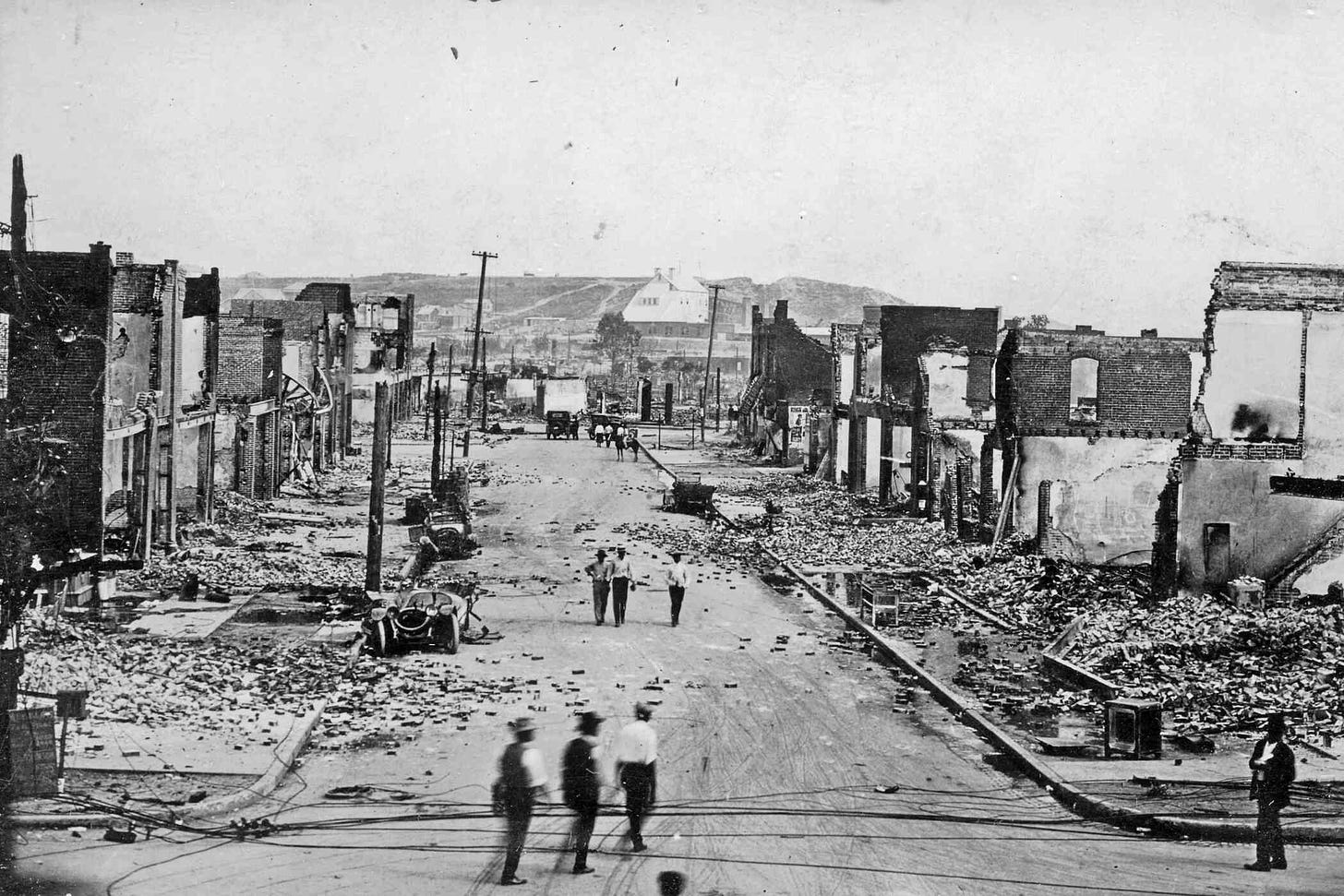
American citizenship hasn’t just failed to guarantee the right to have rights, it’s stripped people of rights they considered inalienable. “…many Haudenosaunee women opposed citizenship because it would subject Native women to the same legal system that continued to oppress white women even after suffrage.” (This excerpt was shared with me by Jesi Taylor Cruz, who will make your life fuller.)
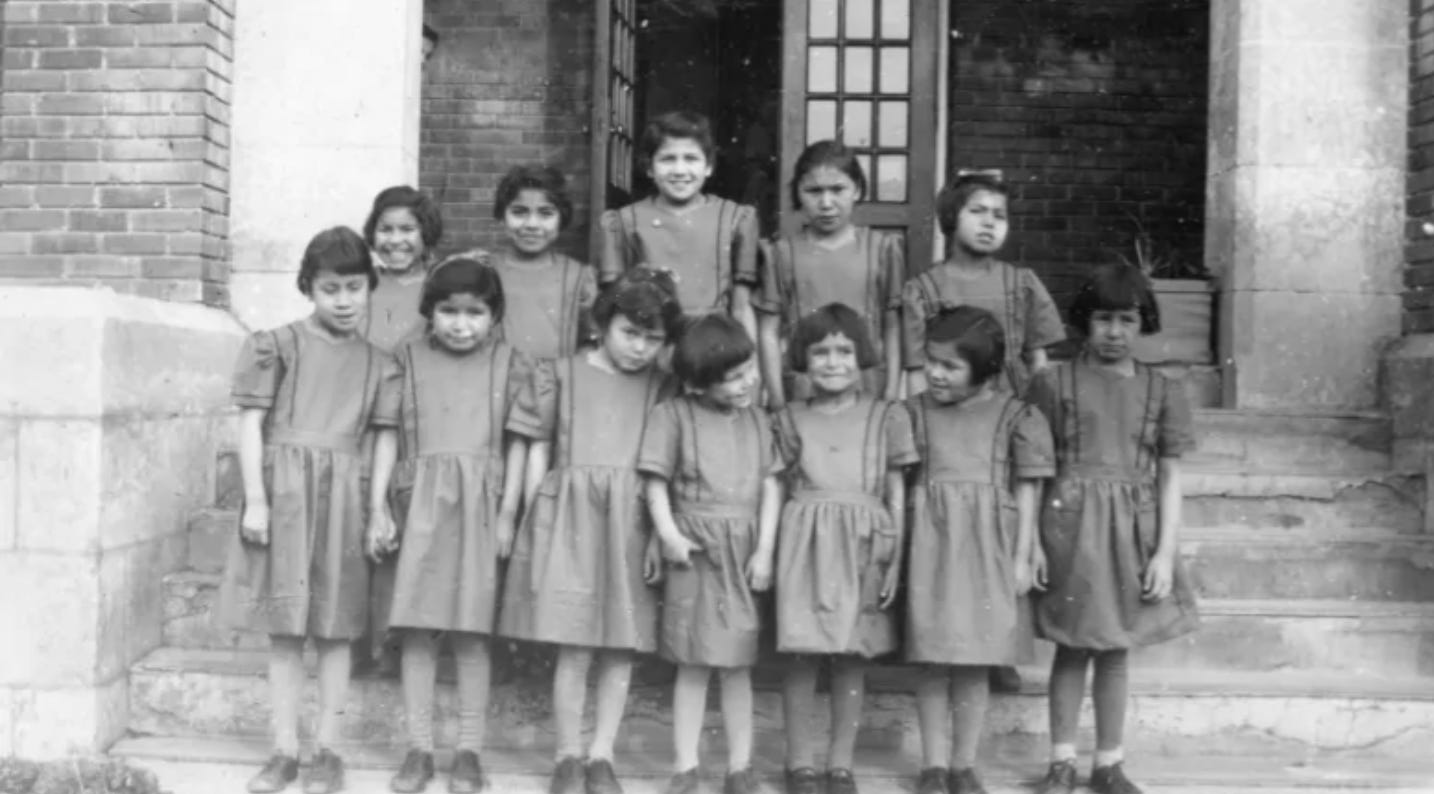
Once citizenship was imposed on Indigenous Peoples, the state used their citizenship to justify a genocidal war on their culture. Arguing it was time for them to assimilate, the state built and endorsed residential schools.
Residential schools in the United States and Canada reached into Indigenous homes and tore children from their families. Many of those children died away from home, alone.
The state doesn’t just fly over American neighborhoods, it patrols them too.
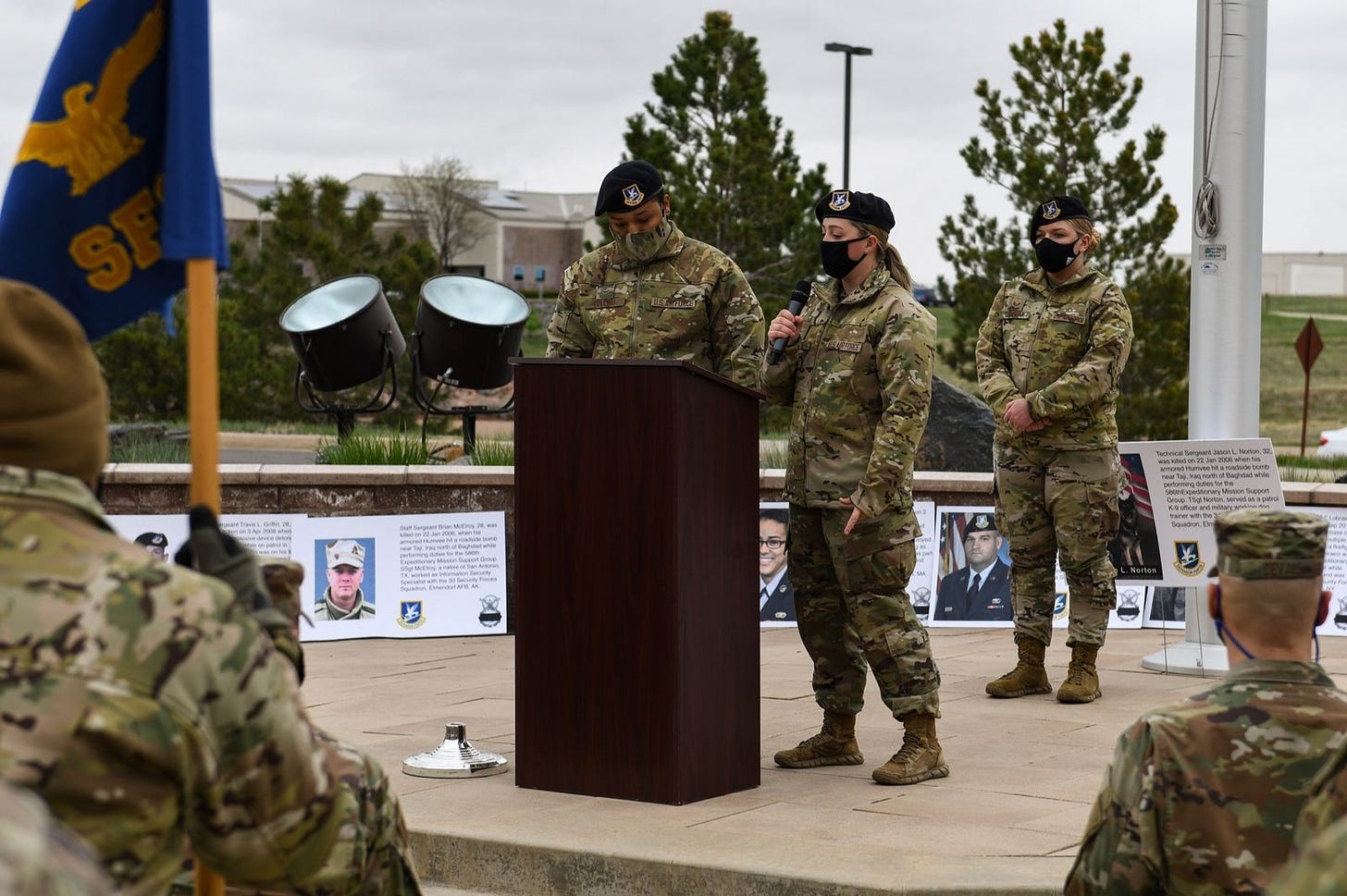
When fighter jets fly over my house, they come from Buckley Air Force Base. In May, Buckley AFB opened up Police Week with an hour and a half long march around the base.
The march and a ceremony afterward expressed appreciation for police officers killed in the line of duty and police officers currently serving.
I rarely understand the rituals of the state, but the meaning of this ritual was clear: police are another branch of the State’s armed forces.
In 2019, Aurora police killed 23 year old Elijah McClain as he walked home.
People who knew Elijah describe him as someone who was a "spiritual seeker, pacifist, oddball, vegetarian, athlete, and peacemaker who was exceedingly gentle.” He’d been homeschooled because of his gentleness.
During breaks from work he went to animal shelters to play the violin and guitar for abandoned animals. He felt the music calmed them. He’d never been accused of a crime. He was beloved by all who knew him.
I hesitate to share all this, as if a Black man must be a vegetarian violinist to be kept safe from state brutality. But writing about who Elijah was as an individual, is one way to keep him from being dehumanized by the state.
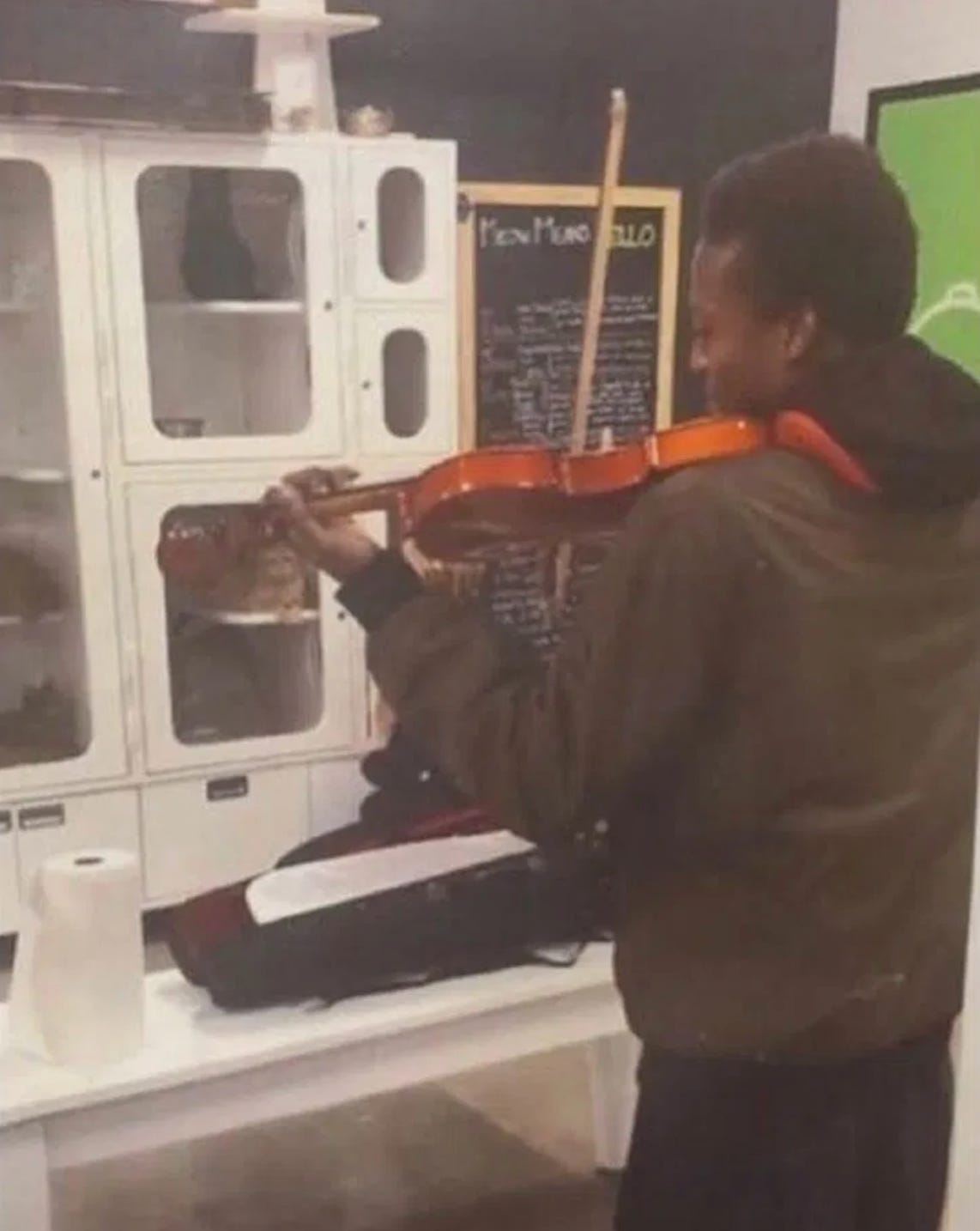
Elijah didn’t hear a bomb whistling through his neighborhood before he died. There was a sound preceding his death, but it was too quiet for him to hear. A neighbor called police to say there was a Black man walking down the street. The neighbor said the Black man wasmoving his arms strangely. Elijah’s arms may have been moving. He was dancing on his way home, listening to music.
The police came. They threw Elijah against a wall. They threw him to the ground. They held him in a carotid choke hold while he sobbed, vomited and apologized. He was so sorry he threw up, he just couldn’t breathe. He lost consciousness. Regained it and apologized again. He didn’t know what he did but he wouldn’t do it again.
The officers pressed down on him until an ambulance they ordered came. They told the medics that Elijah was out of control and needed to be sedated. The medics administered a dose of ketamine recommended for someone 50 pounds heavier than Elijah.
News reports said that Elijah suffered a cardiac arrest in the ambulance. That’s awfully passive, isn’t it? Let’s change that wording to reflect the truth. Police brutality resulted in Elijah suffering fatal cardiac arrest. Elijah's strumming hands became still. He died days later.
Elijah’s assault took place steps from his house. State violence doesn’t have to enter a home to obliterate it. Two months after Elijah’s murder, three Aurora police officers took smiling selfies of themselves imitating a carotid choke hold, in front of a memorial for Elijah.
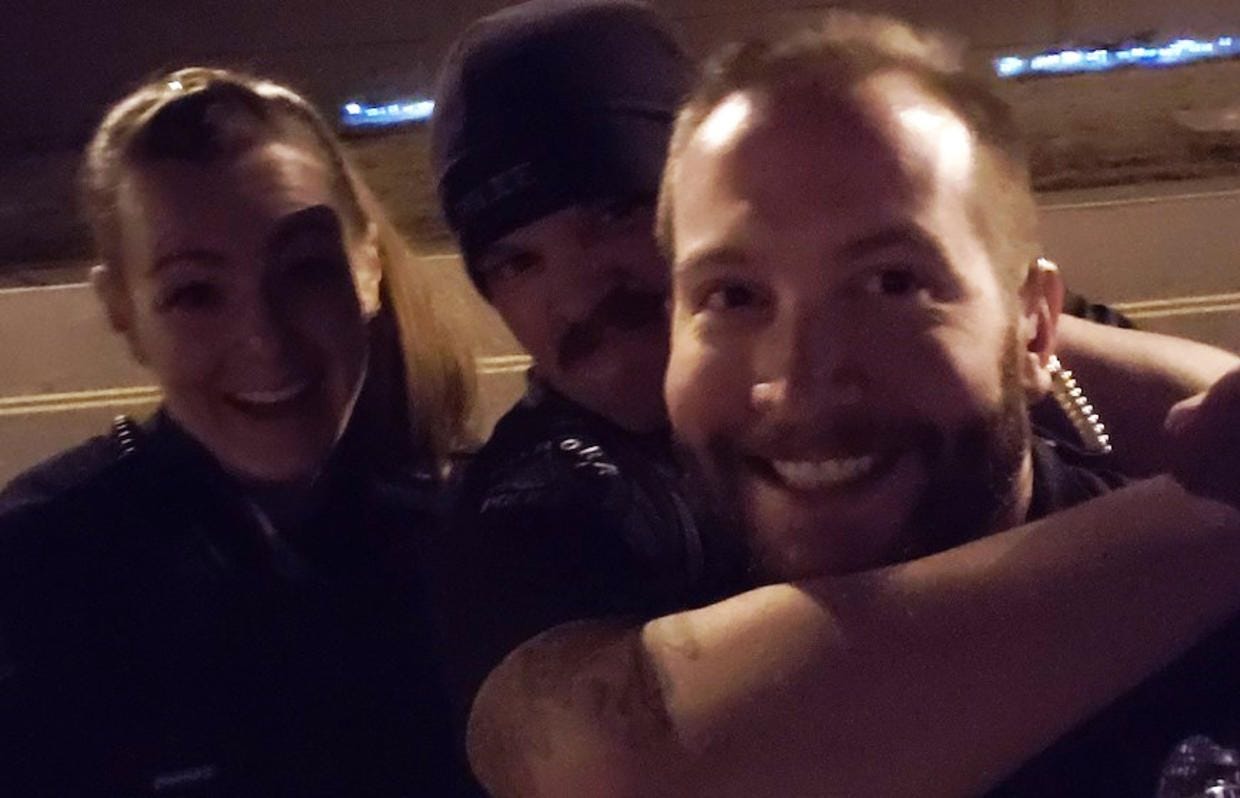
When another state came for Hallaq’s home, a podcast producer recorded her words, knowing they could be her last. When his own state came for Elijah McClain just outside his home, a police bodycam recorded his words. They were his last.
I can't breathe. I have my ID right here. My name is Elijah McClain. That's my house. I was just going home. I'm an introvert. I'm just different. That's all. I'm so sorry. I have no gun. I don't do that stuff. I don't do any fighting. Why are you attacking me? I don't even kill flies! I don't eat meat! But I don't judge people, I don't judge people who do eat meat. Forgive me. All I was trying to do was become better. I will do it. I will do anything. Sacrifice my identity, I'll do it. You all are phenomenal. You are beautiful and I love you. Try to forgive me. I'm a mood Gemini. I'm sorry. I'm so sorry. Ow, that really hurt! You are all very strong. Teamwork makes the dream work. Oh, I'm sorry, I wasn't trying to do that. I just can't breathe correctly.
He died alone.
The modern nation-state does not exist to guarantee human rights. It exists to guarantee its own continued existence. And extracting energy from the turbulence it creates is one way the state sustains itself.
So where does that leave us? How do we guarantee a child’s right to survive? To sleep without fear? I don’t know. But I think Ralph Ellison had an answer.
Ralph Ellison knew that Arendt had a simplified view of the United States. He knew America could not hold her hope until it acknowledged its history and repaired its present.
In a particularly grim moment, Arendt criticized the parents of the Little Rock Nine for helping their children move through the public act of integration. She felt the parents had exposed the children in a fight between adults. In response, Ellison responded,
“I’m referring to the basic, implicit heroism of people who must live within a society without recognition, real status, but who are involved in the ideals of that society and who are trying to make their way, trying to determine their true position and their rightful position within it. Such people learn more about the real nature of that society, more about the true nature of of its values than those who can afford to take their own place in society for granted. They might not be able to spell it out philosophically but they *act* it out. And as against the white man’s indictments of the conduct, folkways, and values which express their sense of social reality, their actions say, “But you are being dishonest. You know that our view of things is true. We live and act out the truth of American reality, while to the extent that you refuse to take these aspects of reality, these inconsistencies into consideration -- you do not live the truth….
Hannah Arendt’s failure to grasp the importance of this ideal among Southern Negroes caused her to fly way off into left field in her ‘Reflections on Little Rock’...”



